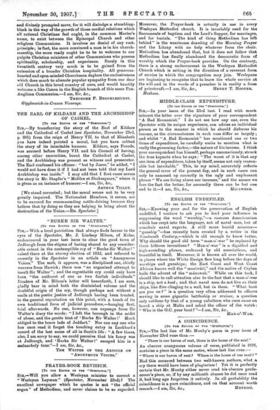" BURKE SIR. WALTER."
[To TIM EOrTOR. Or TIM -Sr tcorkTon."] SIR,—With a local patriotism that always finds favour in the eyes of the Spectator, Mr. J. Lindsay Hilson, of Kelso, endeavoured in your last issue to clear the good town of Jedburgh from the stigma of having shared to any consider- able extent in the contemptible cry of "Burke Sir Walter!" raised there at the stormy election of 1832, and referred to recently in. the Spectator in an article on "Anonymous Voices." The mob, it appears, was a disciplined one, chiefly weavers from Hawick ; there was " no organised attempt to insult Sir Walter"; and the regrettable cry could only have been "the outburst of one or two foolish individuals." Readers of Mr. Hilson's letter will henceforth, I am sure, gladly bear in mind both the diminished volume and the doubtful origin of the cry, though perhaps not without a smile at the poetic justice of Jedburgh having been treated, in the general reprobation on this point, with a touch of its own traditional form of judicial procedure,—hanging first, trial afterwards. No one, however, can expunge from Sir Walter's diary the words : " I left the borough in the midst of abuse, and the gentle hint of 'Burke Sir Walter I' Much obligedto the brave lads of Jeddart." Nor can any one who has once read it forget the touching entry in Lockhart's record of the last scene of all in Scott's life : "A few times, also, I am sorry to say, we could perceive that his fancy was at Jedburgh, and - 'Burke Sir Walter!' escaped him in a melancholy tone."—I am, Sir, &C.,
THE WRITER OF THE ARTICLE ON "ANONYMOUS VOICES."


















































 Previous page
Previous page